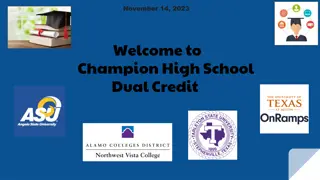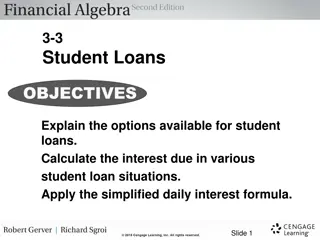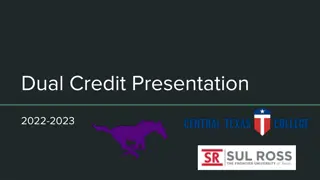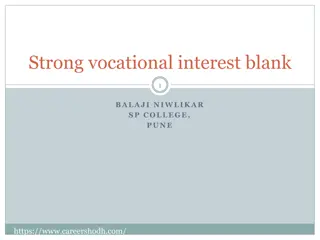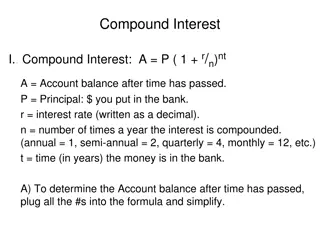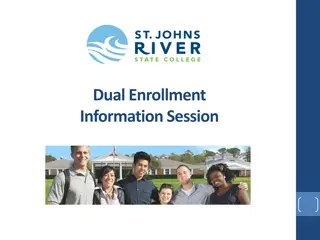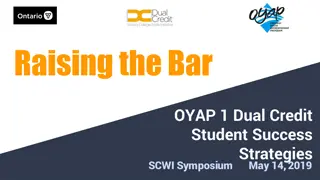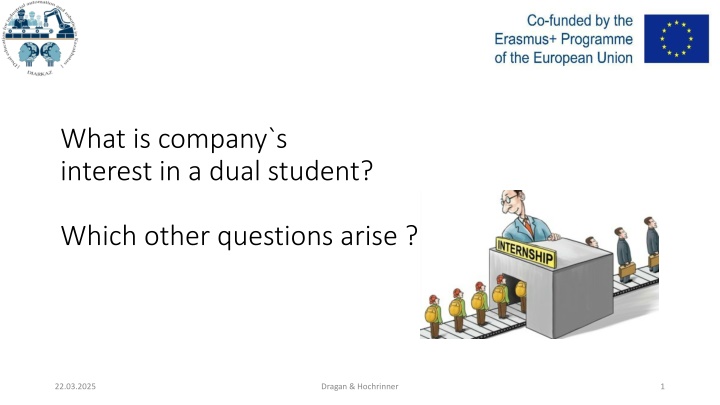
Company Interest in Dual Students & Success Factors
Exploring the benefits of dual students for companies, universities, and students. Learn about the collaboration, innovation, and success factors in integrating students into the workforce. Understand the different organizational models and challenges involved in dual study programs.
Download Presentation

Please find below an Image/Link to download the presentation.
The content on the website is provided AS IS for your information and personal use only. It may not be sold, licensed, or shared on other websites without obtaining consent from the author. If you encounter any issues during the download, it is possible that the publisher has removed the file from their server.
You are allowed to download the files provided on this website for personal or commercial use, subject to the condition that they are used lawfully. All files are the property of their respective owners.
The content on the website is provided AS IS for your information and personal use only. It may not be sold, licensed, or shared on other websites without obtaining consent from the author.
E N D
Presentation Transcript
What is company`s interest in a dual student? Which other questions arise ? 22.03.2025 Dragan & Hochrinner 1
Students: Higher Education Professional practice Income Win Win Win University: tight collaboration with industry ongoing adaptation of the curriculum to current requirements Company: Building HR structure Corporate network Access to external Research Institute 22.03.2025 Dragan & Hochrinner 2
Success factors From From student student learning learning to to company company innovation innovation Make innovation and technology transfer a main goal and outcome of placements: => Many details will follow naturally (Who? What? How? Which university?) View and challenge students in their role as knowledge dealers between university and company and stay in constant contact as our customer : => This would also help with several of the more complicated tasks of University (like triggering research interest in students and attracting faculty experts).
Success factors From From student student learning learning to to company company innovation innovation Facilitate constant reflection-on-doing for all people involved: Student, faculty and company supervisor, from project planning to reporting and finally . => This is a special and attractive opportunity for SMEs a single student can already make a decisive difference!
Simplified differentiation of organizational models Important: There is few/no common definition and a wide range of program types are (mis-)using the same wording! Part Time Study program: Focus on work (students are regular employees of companies), no involvement of company no structured integration of work into the curriculum. Internship: Cooperative Education: More than three rotations, integration with (involvement of faculty) One to two periods of work required in a program, or usually not integrated into competence development without crediting. of core modules. Dual Study: Work occurs in one company only (Apprenticeship: official work contract including time at university). Strong integration into curriculum. 22.03.2025 Dragan & Hochrinner 5
Basic and specific organizational model and challenges COMPANY Work Reflexion Reflexion UNIVERSITY Study nach David Kolb, 1974 22.03.2025 Dragan & Hochrinner 6
Differences for programme management 1. Industry / companies are stakeholders AND educators. 2. Both partners can concentrate on their respective strengths (University = basic science, methodology, Company = management and application) 3. Students are process owners of a 100 % individual path to graduation. QUALITY = COOPERATION + INTEGRATION + REFLECTION 22.03.2025 Dragan & Hochrinner 7
The REAL Challenges of Cooperation Company University Company University Company University Student Student University Company Student COOPERATION AND WORK INTEGRATION FULL TIME STUDY FULL TIME JOB 22.03.2025 Dragan & Hochrinner 8
Recommendations in Kasachstan 2021 1. Always build on existing programmes and cooperation experience / models with professional field and enterprises. 2. Start small but immediately. It is better to take a first step with a little risk than to make big plans. 3. The most needed level of education has to be clearly defined: Vocational training (15-18 years + further education of workers), college level (18-20 years), bachelor level (19-23 years), graduate programs (further education of already trained academics, possibly part time and combined with work). 4. Every cooperation agreement has to be an individualized effort tailored to the participating organizations. Each organization has to contribute what it can do best. 22.03.2025 Dragan & Hochrinner 9
Outlook at important additional measures and activities 1. 2. 3. 4. Corporate Design (e.g. name, logo, mottos, quotes) Public relations activities and management (e.g. social media) Political lobbying for support (community, state, country) Information campaign for schools and parents (clear communication of benefits!) Information campaign for enterprises (clear communication of benefits!) F&D and Innovation hub for participating companies Cooperation with the educational research department National and international university cooperation and information exchange 5. 6. 7. 8. 22.03.2025 Dragan & Hochrinner 10
Mottos we use for each of the partners My company goes to university now! I am employed and paid for studying! We open a new campus with every new partner company! 22.03.2025 Dragan & Hochrinner 11
Choosing the right persons with motivation and skills (1) Most important are initial high profile promoters at the university and in respected companies. Top management of companies and at university have to be actively interested and make a written committment. Needed are skilled work term supervisors (can change according to task, should have either highest possible practical skills or equivalent university degree) and Personally interested mentors (care for career development, HR or general management). Alumni of the program are best suited and often interested to become mentors. 22.03.2025 Dragan & Hochrinner 12
Choosing the right persons with motivation and skills (2) Examples for an integrated strategy: Leadership training and assessment for junior management staff through responsibility for a student. Know-how transfer from experts before retirement through mentoring and supervision. Student as assistant to CEO to work on projects left behind because of lack of time. A rotation through various departments can facilitate selection of best matches by students and future supervisors themselves. 22.03.2025 Dragan & Hochrinner 13
Rhythm There are several kinds of rhythms: Weekly rhythm: 2/3 days at university, 3/2 days in the company Alternating periods on a weekly, fortnightly or monthly basis (alternative presence at the university/company: for a week/week, a fortnight/fortnight, a month/month. Variable rates during the year: more presence at the university at the beginning, and more in the company later on. There is no general perfect rhythm . Everything depends on the kind of job, the economic sector, the geographic aspects (distance between the company and the higher education institution), the way skills can be learned. 22.03.2025 Dragan & Hochrinner 14
Folder 22.03.2025 Dragan & Hochrinner 15
Folder 22.03.2025 Dragan & Hochrinner 16
Folder 22.03.2025 Dragan & Hochrinner 17
Folder 22.03.2025 Dragan & Hochrinner 18
Factsheet What is the training goal? Academic qualification for assistant functions in production-related corporate and R&D areas (quality management, planning, control and optimization of production processes, maintenance, manufacturing and process engineering, materials management, logistics, etc.) as well as for the collaboration or independent processing of small projects . 22.03.2025 Dragan & Hochrinner 19
Factsheet When are the students in the company? From the 3rd to the 6th semester, the students work for a total of 12 full months in the training company. Theory at the university and practice in the company alternate at intervals of around 3 months. (In coordination with the students and the course, the training practice can start in the summer before the 3rd semester and can be shortened accordingly in the 6th semester, for example.) 22.03.2025 Dragan & Hochrinner 20
Factsheet What or in which areas do the students work? In the companies, the students are deployed in projects and / or various company areas in the sense of the educational goal. Finally they solve an operational task agreed with the company as part of the bachelor thesis. (e.g. trainee program, "product support" within the manufacturing company or project processing, from which various company areas are familiarized with, ...) 22.03.2025 Dragan & Hochrinner 21
Factsheet How is the employment relationship of the students regulated? We recommend continuous, part-time employment for the entire duration of the practical training. There is a sample contract checked by the Chamber of Labor and Commerce. Viewed over the entire observation period of two years, this usually results in an average employment level of 50%. For the theoretical phases at the university, a corresponding option for adding and reducing hours on the flexitime account must be provided. 22.03.2025 Dragan & Hochrinner 22
Factsheet What is the student salary? The amount of the salary is determined by agreement between the training company and the students. Depending on the industry, personal situation, previous education, experience or performance of the students, between 780 and 1,200 euros gross / month (14 times a year) are usual. 22.03.2025 Dragan & Hochrinner 23
Factsheet How is the support in the company regulated? It is expedient for the company to name the students a mentor or training coordinator. He is available as a contact person for students and the university for practical training in the company. He supports the students in achieving the training goal within the company in terms of organization and content. The contact details are given by the students to university. 22.03.2025 Dragan & Hochrinner 24
Factsheet Is it possible to spend a semester abroad? Companies and students have the option of arranging practical phases in foreign subsidiaries or branches at any time. With the approval of the company, students have the opportunity to apply for a semester abroad at a partner university. 22.03.2025 Dragan & Hochrinner 25


